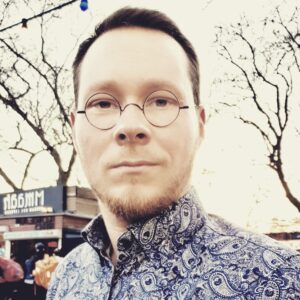What we celebrate and why: International Transgender Day of Visibility
by Henri Vogel
In this blogpost series, we ask our participants to reflect on why certain days have special meaning for them personally and why it is important to celebrate these days in different ways.
Last May, our participant Henri responded to the email that our team member Katja had sent out to the participants group asking for contributions for our blog. Henri suggested writing a piece for our blogpost series “What We Celebrate and Why” about the International Transgender Day of Visibility (TDoV). They agreed to March 31 as publishing date. Today marks the International Transgender Day of Visibility and we are delighted to share this personal text with you! A lot has happened since then: Our former participant has become part of the DialoguePerspectives team – not unusual and always a welcomed addition!
International Transgender Day of Visibility
When speaking of holidays, most people think of religious ones. As members of the queer communities, we are a part of all of them. We grew up with Purim, Christmas, or Eid. Most of us still celebrate them.
In addition, we have a set of holidays for and within our own communities that are mostly about visibility – for good reason. Queer people, unlike almost every other community, aren’t able to share their memories and traditions in a vertical way; they are not passed down through generations. Instead, we share our memories and traditions in a horizontal way. I think that’s the main reason why we strive to be visible throughout the year with different causes and topics: so all our queer siblings have the opportunity to see themselves in us and – if they wish – to join us.
As in any other tradition, we have holidays of joy and of mourning. On the joyful side, we celebrate 17 May as the day when, in 1990, male homosexuality was erased from the list of mental illnesses by the WHO. We celebrate Pride Month in June to commemorate the Stonewall riots, widely viewed as the beginning of gay liberation (although historically not quite correct). And we celebrate Lesbian Visibility Day in April to honour the wonderful women* within our communities. On the other hand, we also observe 1 December as a day to remember those we have lost to HIV as well as 20 November, when we mourn the trans people who have become victims of violence and murder.
I would like to introduce you to one holiday that is special to myself: the International Transgender Day of Visibility on 31 March. Some cities hoist our trans flag to celebrate the occasion with us, we greet each other with “Happy TDoV”, and appreciate the greeting from our friends, families, and allies.
The 31st of March is a day of joy, of celebrating life, survival, and simply ourselves. That may sound self-centred or hedonistic from a dominant point of view. “You are not that important”, one may say, and I would agree if we lived in a fairer world. But as long trans people have to fight for their right to live as they wish in liberal societies and to live at all under illiberal regimes, it’s an achievement to survive and live as well as possible. We are celebrating this by being visible in many different ways: at home, at work, among friends and within our families, in religious communities, in our gardens, at the gym, as old or young, from all over the world. We show ourselves on this day – mostly on social media – our faces, our lives, the things and people we love. In the end, we are showing our humanity.
And we are showing and celebrating our bodies, which is an important and ambivalent thing at the same time. There remains a very strong correlation between what a body looks like and what gender a person is supposed to have. So-called “passing” was and is the safest way to survive as a trans person – meaning as long as nobody recognises that you are actually trans, everything is fine. But this, if you think about it, is neither freedom nor equality. You may have heard the phrase “born in the wrong body”, and for some trans persons this might be true, but not for all. Nothing was wrong with my body, it just needed a bit of adjustment – just like people who get a rhinoplasty.
With social media, it is now much easier to show our different bodies to each other and the world. By doing so, we basically tell stories about a good life and love for ourselves – mind and body, with all the scars we wear, the ones we received voluntarily, and the ones violently inflicted upon us. It’s a very important message of this day: that we’re all worthy of life and love no matter if we want to pass or not, no matter if we do pass or not.
The 31st of March is about visibility and empowerment. Everybody is invited to join – be they queer or not.
Happy TDoV!

Henri Vogel is a religious and cultural scholar who studies the intersections between religion and Alt-Right policies. He is also a queer rights activist and a DialoguePerspectives alumnus since in 2022. He works as a programme manager for DialoguePerspectives and lives in Berlin with his husband and their cat.
